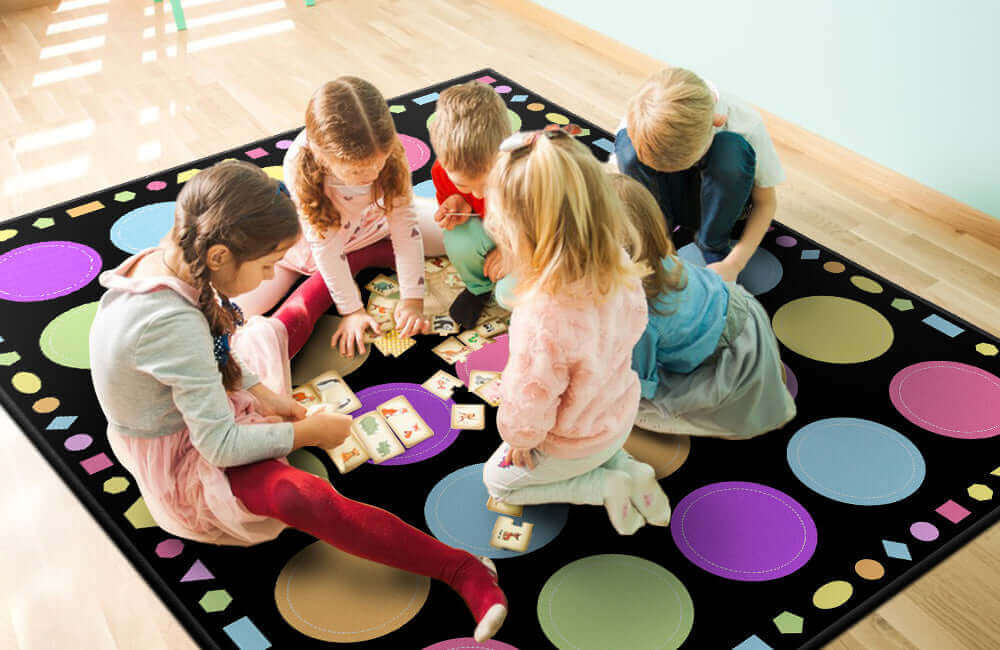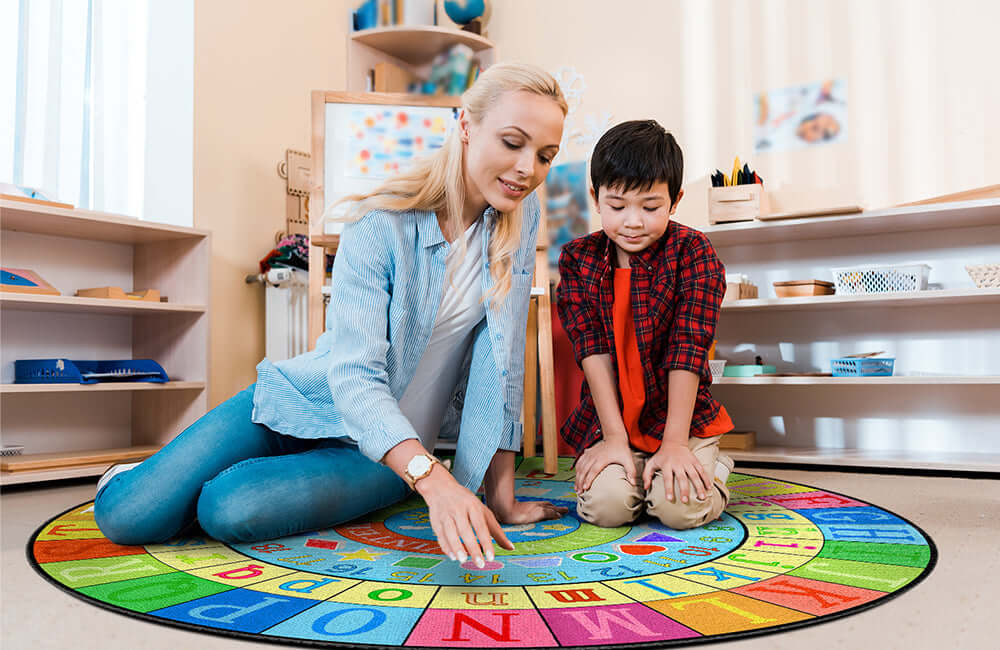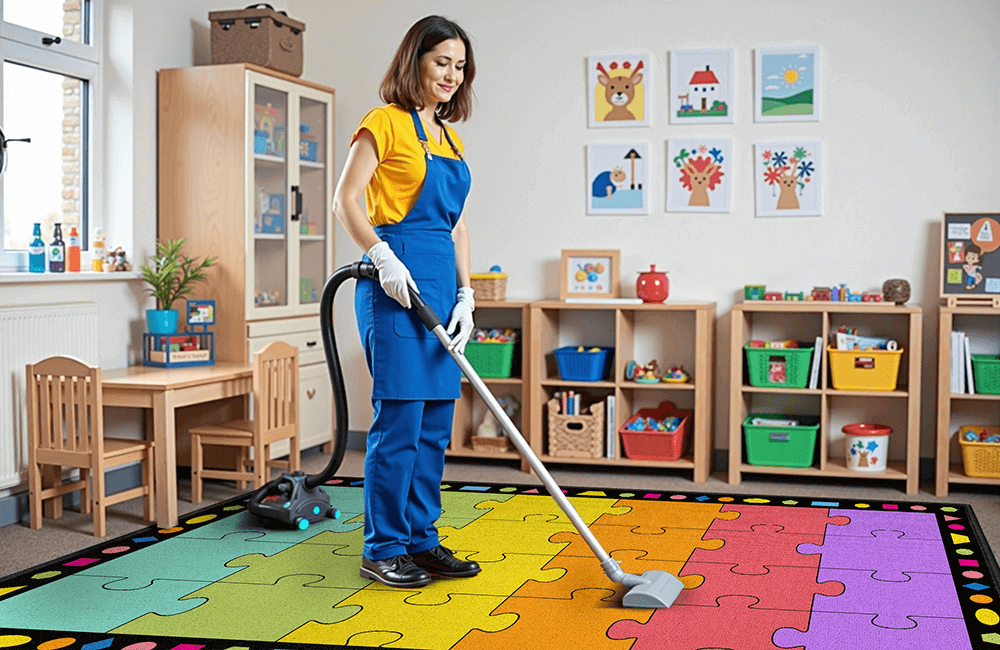Introduction
The excitement of setting up your first classroom can quickly be overshadowed by budget realities.
With teacher spending averaging $500-$1,000 of personal funds on classroom supplies annually, according to the National Education Association, strategic decisions about foundational elements like classroom carpets become essential.
A quality classroom carpet or rug creates a gathering space, defines learning zones, and adds warmth to your educational environment.
However, educational supply catalogs featuring $300+ classroom rugs can be discouraging for educators working with limited first-year budgets.
This guide offers practical, budget-conscious approaches to creating inviting floor spaces without compromising your financial wellbeing.
Why Classroom Carpets Matter
Before exploring budget solutions, it's worth understanding why classroom carpets deserve priority in your setup planning:
Learning Environment Benefits
Classroom carpets create:
- Designated spaces for group activities—especially when using by-activity classroom rugs
- Sound absorption for better acoustics
- Comfortable seating options beyond desks and chairs
- Visual boundaries for different learning zones
Social-Emotional Advantages
Quality floor spaces support:
- Community building during circle time
- Physical comfort that enhances attention span
- Clearly defined "safe spaces" for emotional regulation
- Flexible learning arrangements for diverse needs
According to the Journal of Learning Spaces, "Physical environment elements significantly impact engagement levels, with comfortable floor seating showing particularly positive effects for early primary students."
Budget-Friendly Sourcing Strategies
Contrary to what educational supply catalogs suggest, quality classroom carpets don't require breaking the bank:
Beyond Educational Supply Companies
Expand your search to:
- Home improvement stores (especially remnant sections)
- Discount home goods retailers
- Online marketplace sites with free local pickup
- Warehouse clubs offering seasonal discounts
Timing Your Purchases
Strategic shopping includes:
- End-of-summer clearance sales (July-August)
- Black Friday deals for home goods
- January white sales that often include floor coverings
- End-of-fiscal-year school budget remainders (often May)
Community Resources
Explore these often-overlooked options:
- School district warehouse/surplus programs
- Parent-teacher organization mini-grants
- Local business classroom sponsorship programs
- Community foundation classroom enhancement grants
Many new teachers report success with DonorsChoose campaigns specifically for classroom environment enhancements, particularly when framed around inclusion and accessibility.
DIY Carpet Solutions
When commercial options exceed your budget, consider these creative alternatives:
Modular Approaches
- Foam interlocking tiles (often marketed for playrooms)
- Carpet sample squares arranged in patterns
- Individually bound carpet remnants that can be arranged and rearranged
- Cushioned exercise mats covered with washable fabric
Unconventional Materials
Some teachers have successfully repurposed:
- Canvas drop cloths painted with educational elements
- Outdoor tablecloths with flannel backing
- Flat bed sheets with non-slip backing applied
- Shower curtains backed with non-slip material
Education blogger Teach Junkie advocates for "thinking beyond traditional classroom furnishings" and suggests, "The most important quality of a gathering space isn't its price but its functionality and comfort."
Visit our DIY Classroom Projects section for step-by-step instructions on creating no-sew floor cushions to complement your budget-friendly carpet solutions.
Maximizing One Carpet's Versatility
When budget constraints limit you to a single carpet, maximize its utility:
Multi-Purpose Design Elements
Look for carpets featuring:
- Simple geometric patterns—like those on our pastel classroom rugs—that work across subjects
- Border elements that can define spaces or support games
- Neutral colors that won't clash with seasonal decorations
- Sufficient plain space for versatile use
Portable Design Considerations
Seek features that support flexibility:
- Lightweight construction for easy movement
- Bound edges that resist fraying when frequently moved
- Materials that fold or roll without permanent creasing
- Stain-resistant surfaces that clean easily between uses
Extending Functionality
Amplify your carpet's uses with:
- Removable seat markers (adhesive felt circles)
- Transparent pocket chart overlays for changing themes
- Erasable fabric markers for temporary customization
- Complementary floor cushions for differentiated seating
Our Classroom Space Planning Guide provides additional strategies for creating multi-functional learning zones with limited resources.
Maintenance Tips to Extend Lifespan
Proper maintenance ensures your budget-friendly carpet remains classroom-worthy longer:
Preventative Care
Establish routines for:
- Regular vacuuming (daily if possible)
- Immediate spot treatment for spills
- Rotation to distribute wear patterns
- Proper storage during extended breaks
Deep Cleaning Schedule
Budget for:
- Monthly deep cleaning with appropriate cleaners
- Quarterly sunshine exposure for natural disinfection
- Semester-break professional cleaning (or DIY extraction)
- Annual assessment for repairs or binding maintenance
Student Involvement
Create sustainable systems by:
- Establishing clear carpet area rules
- Teaching proper sitting and movement protocols
- Assigning simple maintenance responsibilities
- Recognizing careful use and respectful treatment
According to Education World, "When students participate in caring for classroom environment elements, they develop both responsibility and ownership of the learning space."
Community-Building Through Classroom Spaces
Budget constraints can become unexpected opportunities for community engagement:
Parent Involvement Opportunities
Consider organizing:
- Classroom carpet fundraising initiatives
- Parent volunteer carpet cleaning days
- Family crafting events for floor cushions
- "Sponsor a square foot" mini-fundraisers
Business Partnerships
Local businesses may provide:
- Carpet remnants or discontinued samples
- Professional cleaning services as in-kind donations
- Funding for classroom environment elements
- Materials for DIY carpeting solutions
Student Ownership
Involve students in:
- Designing ideal gathering spaces
- Researching affordable options
- Creating complementary elements
- Establishing care routines and responsibilities
Visit our Teacher Community Resources page for templates of parent donation request letters and local business sponsorship proposals.
Planning for Future Investments
While working with initial budget limitations, develop a strategic plan for future investments:
Documentation Strategy
Keep records of:
- How carpet areas are utilized throughout the year
- Student engagement patterns in different spaces
- Maintenance challenges with budget solutions
- Design elements that would enhance learning
Strategic Investment Planning
Consider a multi-year approach:
- Start with a basic, functional gathering carpet
- Add specialized area rugs as budget allows
- Invest in quality carpet for high-use areas first
- Gradually replace temporary solutions with durable options
Professional Development Connections
Link environment improvements to professional growth:
- Connect carpet zones to instructional strategies in professional evaluations
- Document space utilization in teaching portfolios
- Research physical environment impacts for professional learning
- Apply learning space research to grant applications
The Center for Active Design emphasizes that "Educational environment improvements that are supported by instructional rationale are more likely to receive administrative and community support."
Conclusion
Creating effective classroom carpet spaces on a new teacher budget requires creativity, strategic thinking, and prioritization.
By exploring alternative sourcing, embracing DIY solutions, maximizing versatility, and engaging community support, you can establish functional gathering spaces that enhance learning without compromising your financial wellbeing.
Remember that the most important aspect of any classroom environment element is not its price tag but its ability to support your instructional goals and create a sense of community.
Starting with budget-friendly solutions allows you to learn which features and arrangements best support your teaching style before making larger investments.
As your career progresses, the experience gained through creative problem-solving and strategic resource allocation will serve both your professional development and your students' learning experiences.
Your classroom environment, like your teaching practice, will evolve over time—starting with budget-conscious foundations ensures sustainable growth.




Leave a comment
This site is protected by hCaptcha and the hCaptcha Privacy Policy and Terms of Service apply.